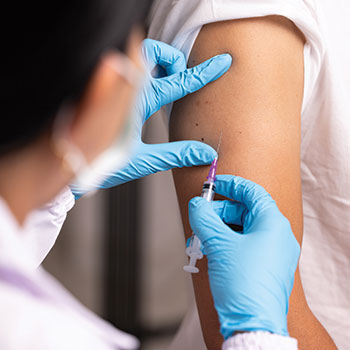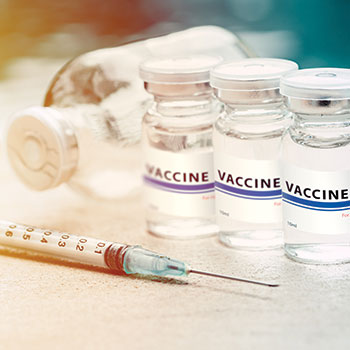Raising awareness about HPV-related cancers
The human papillomavirus (HPV) vaccine can potentially prevent more than 90% of HPV-associated cancers. Generally given to teens, it can be offered to adults as well.
The human papillomavirus (HPV) vaccine has dramatically reduced HPV infections and helped prevent most HPV-related cancers since it was first approved in 2006. However, recent research reveals a decline in public awareness about HPV's connection with cervical and other types of cancer, highlighting a pressing need for patient and clinician education to increase vaccine uptake, according to experts.
“The vaccine was first promoted as a cervical cancer vaccine for girls, and many people still think of it that way,” said Eric Adjei Boakye, PhD, assistant scientist in the departments of health sciences and otolaryngology at Henry Ford Health in Detroit and lead author of a recent study on awareness of HPV-associated cancers. “Awareness that HPV also causes several other types of cancer (specifically anal, throat, penile, vaginal, vulvar) affecting both genders has remained low.”

The study, based on a nationwide survey of adults ages 18 years and older, found that the percentage of respondents who knew that HPV could cause cervical cancer dropped from 78% to 70% between 2014 and 2020, while only about 30% of respondents knew that HPV is linked to anal, oral, and penile cancers. That lack of awareness may be contributing to low completion rate of the vaccine among adolescents, as only about 58% of adolescents in the United States have received all recommended doses, according to the most recent CDC statistics.
“Internists often think of HPV vaccination as a pediatric issue and that it's not important or effective to administer at later ages,” said Dr. Adjei Boakye, who presented findings from the survey at the American Association for Cancer Research's annual meeting in April. “But studies have shown that it can be beneficial well into adulthood, and it is approved to be given up to age 45.”
HPV and cancer
The HPV vaccine is extremely effective in preventing HPV and can potentially prevent more than 90% of HPV-associated cancers, which also include vulvar, vaginal, and oropharyngeal cancers, according to the CDC. Current guidelines recommend getting two doses of the vaccine if initiated between the ages of 11 and 15 years (it can be started as early as 9 years of age) or three doses if initiated after age 15 years. Vaccination is recommended up to age 27 years, and physicians are advised to discuss it with patients up to age 45 years.
Since the vaccine was introduced, HPV infections, genital warts, and cervical precancers have fallen by 88% in teen girls and 81% in young adult women, according to the CDC. While regular Pap smears can detect HPV and precancerous cells in the cervix, there are no routine screening tests for other HPV-related cancers.
Unfortunately, vaccination is rarely discussed with adults older than age 27 years due to a misperception that it's not effective in people previously exposed to HPV, which includes the majority of sexually active adults, said Dr. Adjei Boakye. However, vaccination can offer important protection regardless of patients' prior experience with HPV.
“There are 150 types of HPV, but most cancers are caused by two strains [16 and 18],” he said. “It's quite possible that someone has HPV infection but not the types that cause cancer that are targeted by the vaccine.”
Increasing vaccine acceptance over the years has been challenging partly due to lack of universal school mandates, which have proven to be effective with other adolescent vaccines, such as the pertussis booster and meningococcal vaccine, said Rachel Caskey, MD, MPP, FACP, professor of medicine and pediatrics at the University of Illinois Chicago, whose research focuses on improving national vaccination efforts.
Additionally, a stigma around sexually transmitted diseases (STDs) has led some parents to refuse vaccination for their children.
“We need to normalize this as an anticancer vaccine that's important for everyone,” said Tahniat Syed, MD, MPH, clinical director of adolescent medicine and young adult health at the University of Pittsburgh Medical Center. “It should be as well accepted as the hepatitis B vaccine, which we give routinely at birth to protect against a sexually transmitted infection that is associated with liver cancer.”
There is also a lingering public perception that the vaccine isn't as important for males, noted Dr. Caskey. A robust nationwide media campaign followed initial approval of the vaccine for girls, but there was less media attention surrounding the expanded approval for males in 2009.
That lack of public awareness may be fueling a rise in HPV-related cancers in men, according to recent research. An April 2023 article in the Delaware Journal of Public Health found that HPV-related oropharyngeal cancer has surpassed cervical cancer as the most common HPV-related cancer, and men are more likely to be diagnosed than women. Current national projections show an upward trend from almost 20,000 annual cases in 2019 to more than 30,000 by 2029.
Misinformation about vaccines in general, spread through social and traditional media outlets, may also contribute to low uptake, said ACP Member Julie Venci, MD, associate professor of medicine at the University of Colorado and an internal medicine-pediatrics specialist at Denver Health's Southwest Federico Peña Primary Care Clinic in Denver.
“Despite being a safe and well-studied vaccine that prevents several types of cancers, many still question the HPV vaccine's efficacy, safety, and benefits,” she said. “If we want to increase vaccine uptake, we must understand what information patients are receiving or hearing before coming into our clinical spaces and focus on addressing those concerns.”
Counseling patients
Since the HPV vaccine is recommended up to age 27 years, it's essential for internal medicine physicians to initiate discussions and make it available during regular visits, said Dr. Venci. In some states, such as Colorado, teens can consent to the HPV vaccine during reproductive health visits, a natural time to talk about protecting against STDs.
“In these early years of young adulthood, patients are learning to make health decisions previously made by parents or caregivers,” she said. “It's a perfect opportunity to discuss the HPV vaccine and its benefits if someone hasn't received it.”
Dr. Venci and others advise physicians to focus on cancer prevention, while being prepared to answer any questions patients might have about HPV.
“The reason this vaccine exists is because some types of HPV may go on to cause cancer,” noted Dr. Caskey. “Talking to patients about the possibility of preventing a future cancer experience is a very different message than discussing the risks of HPV transmission.”
Dr. Caskey urges internal medicine physicians to offer the vaccine to all unvaccinated patients up to age 45 years, regardless of perceived risk. The topic should be incorporated into wellness visits and discussed along with other recommended vaccines, such as influenza, and routine preventive screenings, such as for breast and colon cancer.
“In my experience, this is an easy conversation to have with adults once they understand that the vaccine can prevent cancer,” she said. “Most people aren't interested in getting into nuanced details beyond what the vaccine is for and that their trusted clinician recommends it.”
While the vaccine is not known to treat existing HPV, it can still be beneficial for patients with prior high-risk infections, said Dr. Syed.
“I had one young adult patient who had not been vaccinated come to me with high-risk HPV,” she said. “After counseling her about undergoing appropriate treatment, we discussed how getting the vaccine could potentially protect her from getting a high-risk type again in future.”
In some cases, patients may not know whether or not they have been vaccinated, said Dr. Venci. However, there is no harm in repeating the series.
“If the vaccination history is unknown and the patient would like to be vaccinated, we do it,” she said. “Often we try to obtain vaccine records first, especially since most are in electronic medical records now or databases like the Colorado Immunization Information System.”
Internal medicine physicians should keep the vaccine in stock and have informational materials on hand in the waiting room and available as handouts, she said. Physicians should also consider taking continuing medical education courses on HPV vaccination and related cancer prevention.
The current requirement to get three shots after age 15 years is an additional hurdle for many patients, said Dr. Adjei Boakye. However, they can be reassured that the vaccine provides immediate benefit.
“It appears as if even one shot offers substantial immunity, and widespread uptake in a region can create herd immunity,” he said. “Due to cost, most developing countries recommend one dose.”
Additionally, the three-shot series does not have to be given at specific time intervals, said Dr. Syed. Patients can choose to get the second and third shots at their convenience.
Improving access to care can also result in broader adoption of the vaccine, said Dr. Adjei Boakye. Mobile clinics, for example, have improved mammography screening rates in remote areas.
“We need to take health care to people where they are,” he said. “Even if the vaccine is free, many patients are unlikely to travel far from home and take time off from work to get a vaccine that has no immediate benefit.”
Going forward, internal medicine physicians can play a key role in educating and improving vaccination rates among patients who missed out on opportunities as children, said Dr. Syed and Dr. Adjei Boakye.
“Pediatricians are doing as many vaccinations as they possibly can, but uptake is still around 56%,” Dr. Syed said. “It's important for internists to know what the uptake rates are so they can focus on catching the other half as adults.”



